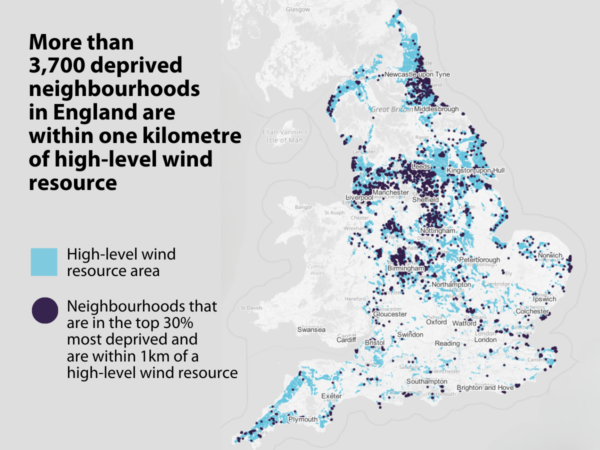Our new report for climate charity Possible shows that enabling community-owned turbines could alleviate fuel poverty and protect consumers, the climate and national energy security.

Onshore wind is one of the cheapest energy sources available, and offers stable and predictable prices that protect consumers from the volatility and price spikes of gas. Yet solutions to get households off gas power and on to clean electrified heating, such as heat pumps and heat networks, are being deployed far too slowly.
Our latest report, commissioned by climate charity Possible, explores the potential for new community onshore wind projects to unlock part of the puzzle of making clean, local heat cheaper and therefore more attractive to roll out, ideally at scale.
Deploying heat pumps or heat networks at community scale, rather than one household at a time, has multiple benefits: it offers the potential for faster deployment and swifter emissions reductions, while also offering consumers lower prices, a greater sense of confidence and more support, and affording local installers a more reliable supply of work.
Wind-powered heat: Powering clean heat with clean energy to cut costs and emissions models the match between wind power generation and heating demand, finding that wind is a good match for the electricity needed for clean heat – unsurprisingly, as winter is windier than summer. Its key findings include:
- Wind power and heat pumps complement each other, with wind being more prolific and heat being in greater demand during the winter.
- Heating homes with locally generated renewable electricity could reduce annual energy bills by nearly a third while cutting emissions by 90%.
- With 3,700 of the most deprived neighbourhoods in England within 1km of an area with good onshore wind resources, the Wind+Heat model has the potential to help ‘level up’ the UK, alleviating fuel poverty and enabling a just transition to net zero.
- Systemic changes are required to realise this potential, particularly around the calculation of electricity bills, onshore wind planning, and community support, financing and innovation.
Possible and Regen are calling on the government to remove the planning restrictions on onshore wind in England and unlock clean, cheap energy and heat for the benefit of communities. Our recommendations include:
- Government should remove the current planning restrictions on onshore wind.
- Energy bills should be ‘rebalanced’ to reflect the lower costs and emissions of renewable energy, disincentivise gas and encourage investment in electrified heat.
- There should be more support for community-led onshore wind projects, including technical advice and access to grant funding and low-cost finance.
- The Boiler Upgrade Scheme should be expanded to include homes taking part in community schemes.
- New governance and ownership models for both community-owned renewables and shared heat infrastructure need to be developed.
- Networks should recognise the potential for Wind+Heat projects that locally match electricity demand and generation to result in lower network losses and innovate ways for communities to access those savings and include them in their business models.
Poppy Maltby, Regen’s head of local energy, said: “This report shows that onshore wind and our aspirations for decarbonised heating go hand in hand. But at the moment the benefits of matching demand and generation at local level are not recognised or supported by the system.
“We need government and regulators to be thinking more about local energy. They must provide more and better ways for the energy system to support local community-owned generation linking up with local demand, and for everyone – including our energy networks – to benefit from that.”
Dr Rebecca Windemer, planning and communities lead at Regen, said: “We know that we need to go much further and faster on clean heat to hit our net zero targets, and our report gives the government the keys to a real solution.
“This report shows that locally owned turbines could bring down bills while cutting carbon, but we desperately need policy change to enable communities to directly benefit from these projects.
“We want to see proactive policy support for community-owned generation schemes and the full removal of the current policy restrictions on onshore wind.”
Read the full report here. Data viz of key findings from the report is available here. To discuss this work further, please contact Poppy Maltby or Rebecca Windemer.
